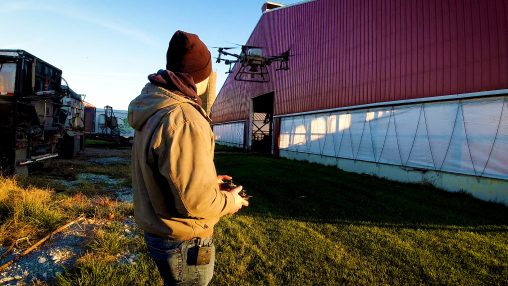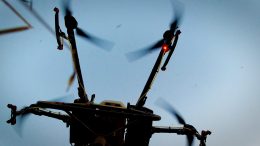Andrew Albers is no stranger to hard work and long hours. He grew up on his family’s 189-year-old dairy farm located about a mile west of Minster, Ohio. Today, he helps local farmers produce healthy crops with his drone business.
When it was time to look for colleges after graduating from Minster High School, Albers picked Wright State University’s Lake Campus because it offered courses in agricultural business management and was only 20 minutes from home.
“There is a lot of financial stuff that goes into farming,” said Albers, who obtained his bachelor’s degree in technical and applied studies in 2017 from Lake Campus.
He credits Wright State for its Integrated Pest Management course, which allowed him to acquire a Commercial Pesticide Applicator License, which is needed to own or operate a pesticide business.
“I’ve met a lot of people through Wright State Lake over the years and a lot of business owners,” he said.
Those networking opportunities have come in handy since Albers founded A&M AG Drone Services and A&M Transport a year after graduating.
“It’s growing really fast,” said Albers.
His company uses four large DJI Agras T30 drones capable of fungicide spraying and interseeding to offer crop services to farmers who until recently had relied on planes or helicopters for these services.
“These planes will come in for a week and then be gone for a week and maybe come back for another week,” he said. “Meanwhile, there’s corn that needs sprayed between the time they were gone. I’m able to go in and get it done whenever it needs done.”
Albers had never flown a drone before starting his business. He describes himself as “not a very tech-savvy guy,” but after watching videos of the drones being used on farms out West, he thought he could make it profitable in Ohio and quickly learned to pilot the aircraft.
Albers has been racking up flyer miles since he started drone flying in 2022. He flies 100 to 120 hours per week, and his business has serviced over 28,000 acres this past year.
Albers said drones are perfect for smaller-sized farms. Each of his four drones carries 8-gallon spraying tanks that can service 40 to 50 acres per hour. The technology allows Albers to spray at a lower elevation than a plane or helicopter, which eliminates accidentally spraying nearby fields, provides easy access to field corners and helps his drones avoid powerlines.
“A lot of these farmers are happy with it,” said Albers, whose pinpoint spraying has helped produce a larger yield but also an easier harvest with less down corn in the rows.
Albers said his business is one of the area’s largest drone spraying companies and has been adding new clients all season. His goal is to double his clients and staff every year.



 Walking through open doors
Walking through open doors  Adventures await
Adventures await  Wright State to expand nursing facilities to meet workforce needs and prepare more graduates for in-demand careers
Wright State to expand nursing facilities to meet workforce needs and prepare more graduates for in-demand careers  Wright State student-athletes make a lasting impact on local family with more to come
Wright State student-athletes make a lasting impact on local family with more to come  Wright State names Rajneesh Suri dean of Raj Soin College of Business
Wright State names Rajneesh Suri dean of Raj Soin College of Business 